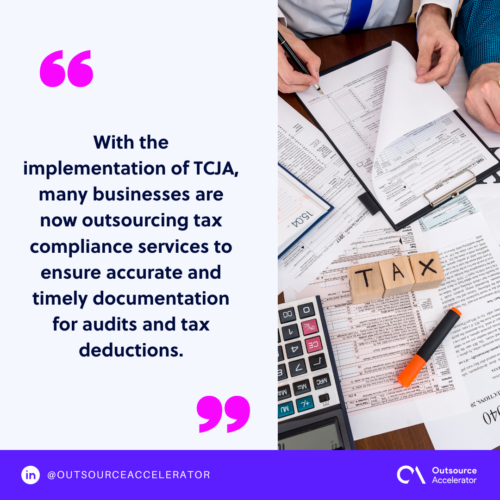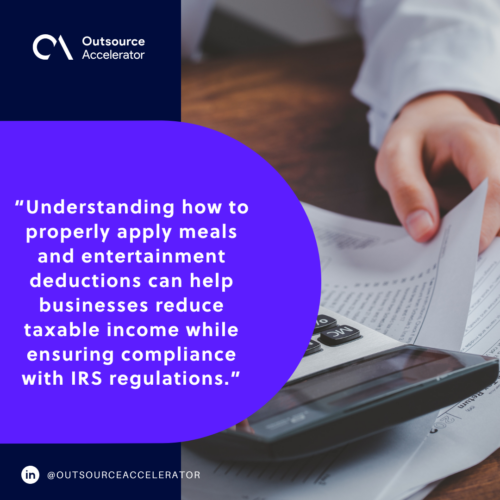4 Must-have business strategies for meals and entertainment deductions in 2026

Building strong relationships with prospects and clients is a key strategy that many business experts emphasize for long-term success.
Meals and entertainment are very significant in client acquisition and retention. This is why major companies organize events and conferences to foster engagement with both clients and employees.
Recognizing this, the government included these expenses in the Tax Cuts and Jobs Act (TCJA), which allows businesses to claim tax deductions for qualifying meals and entertainment costs.
Understanding meals and entertainment deduction
There are measures to determine whether meals or entertainment apply to deduction. Usually, 50% and 100% deductions may apply if expenses are deemed applicable.
All expenses for meals and entertainment shall be used for the company’s official meeting, recreation, or amusement activities.
Meanwhile, under the new law of TCJA, a 50% deduction for taxpayers is still applicable to the cost of business meals if the employee is present and the beverages and food served are not lavish or too expensive.
What are the deductible meals and entertainment expenses?
With the implementation of TCJA, many businesses are now outsourcing tax compliance services to ensure accurate and timely documentation for audits and tax deductions.
It is to ensure that documentary requirements during an audit and filing for tax deduction are timely and accurate, given that these are shared benefits of the company, employee, and client.

Let us take a background of deductible meals and entertainment that your organization should know:
#1 Meals deduction
The general rule for this deduction is set at 50% deduction. This applies to meals acquired for all official business-related activities that meet the following conditions:
- Meals acquired for company and client meetings to discuss business
- Meals for official business travel
- Meals provided for on-call employees or to those working overtime
- Meals during conferences, forums, and other official meetings
#2 Entertainment deduction
Unlike meal deductions, TCJA eliminated deductions for most entertainment expenses.
Previously deductible entertainment activities, such as sporting events, golf outings, concerts, and recreational activities, are now nondeductible even if they are business-related.
Here are the applicable entertainment activities that are still deductible:
- Meals provided during an entertainment event (e.g., food served at a sporting event) are still 50% deductible if the food and beverages are separately stated on the invoice.
- Entertainment expenses directly related to the business (very rare cases, such as a company that hosts ticketed entertainment events as part of its business model).
Preparing for an International Revenue Service (IRS) Audit
Preparing for meals and entertainment audits is document-heavy and tedious. It is no surprise that many firms are now utilizing digitalization to improve tax compliance.
Like any other benefits and deductions, the IRS also has a set of documentary requirements and measures to review and assess before approving the deductions.
Below are requirements and measures when filing your company’s meals and entertainment deductions:
- Have an official trade or business
- Expenses shall be just and ordinary based on the needs of the business
- Create detailed records of the activity, including the amount of bills, time, place, and business purpose among others
- Secure copies of receipt transactions and contracts to support the breakdown of expenditures.
4 must-have business strategies for meals and entertainment deductions
Businesses can still deduct up to 50% of meal expenses when they meet IRS requirements, but the TCJA significantly reduced entertainment-related deductions.
While entertainment expenses are generally no longer deductible, businesses can still claim meals provided during a business-related event—as long as they are purchased separately from the entertainment.
Here is the list of must-have strategies for meals and entertainment deductions that your accounting team should know:
#1. Have a separate ledger account for meals and entertainment
To ensure compliance and accurate reporting, businesses should track meals and entertainment expenses separately. Since most entertainment expenses are no longer deductible, clear documentation helps avoid misfiling deductions.
Best practices:
- Request itemized receipts showing food and beverage costs separately from entertainment expenses.
- Use tax software solutions that integrate the functions of accurate recording and categorizing expenses appropriately.
- Ensure that meals meet IRS guidelines, as mentioned above.
#2. Innovate documentation system
Proper documentation is key to passing an IRS audit. The IRS requires detailed records for meal deductions, including:
- Date, location, and purpose of the meal
- Names and business relationships of attendees
- Itemized receipts or invoices showing separate costs for meals and entertainment
Best practice: In some cases, designate or assign an employee who will focus on the documentation requirements of the event.
The assigned personnel should be knowledgeable about the list of requirements and the process for filing meals and entertainment deductions. That way, it is easy to coordinate and secure all documents needed.
#3. Train your team on deductible expenses
Understanding IRS rules on meals and entertainment helps prevent misclassified expenses and potential penalties. Businesses should ensure employees responsible for expense tracking know which types of meals and entertainment are deductible.
The help that each member of the team can contribute will shape the readiness of the business. Providing learning sessions will help in ensuring that expenses are categorized properly and reduce errors.
Best practice: Some organizations hire tax experts in case of limited manpower and with the help of outsourcing service providers.
#4. Strategize business events for maximum deductions
Take the time to conceptualize upcoming events and see how these would cater to the applicability of meals and entertainment deductions.
Organizing a company-wide event, like team building or fellowship parties is fully deductible and must be considered when planning the calendar of activities.
In case of travel, always keep in mind the measure to make expenses reasonable and only for official business activity.
Increasing meals and entertainment deductions with convenience
Understanding how to properly apply meals and entertainment deductions can help businesses reduce taxable income while ensuring compliance with IRS regulations.

One effective strategy is leveraging expense management software to digitally track receipts and categorize expenses in real-time. This minimizes errors and ensures all meal-related costs are properly recorded.
Additionally, businesses should:
- Regularly schedule business meals that meet IRS deduction criteria
- Maintain clear expense policies to ensure compliance and consistency
- Keep itemized receipts separating meal costs from entertainment expenses
By following these best practices, businesses can maximize deductible expenses while simplifying tax compliance.







 Independent
Independent




